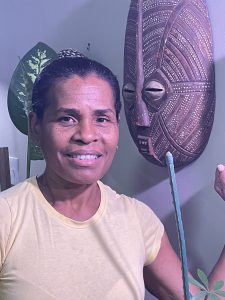By Julia Gaspar-Bates

Photo Credit: Julia Gaspar-Bates
Sharon Pierre grew up in the outskirts of Arima, on the Caribbean island of Trinidad, an area inhabited by different indigenous tribes, notably the Carib. Sharon’s ethnic ancestry is a blend of Carib, French, Portuguese, Spanish, English and Chinese. She spent her early years in a small village where she lived with her grandparents, who raised her, in a house built on stilts because of frequent flooding.
“Everybody knew everybody,” Sharon recounted. “Childhood was a lot of fun. Christmas was very special. I didn’t receive a lot of gifts from family because they could not afford it, but a villager would host a party for all the kids, as there was no Santa Claus. There was a bran tub [a steel drum filled with sawdust], and toys would be put in it for each child to choose a gift.”
However, growing up in such a rural environment was not without challenges, and Sharon remembers lines of people waiting with buckets at a communal pump; most people didn’t have running water in their homes. Additionally, tropical storms often wreaked havoc on the area because of its poor infrastructure. “One day, I came home from school, and the rain came down from the mountain and destroyed all the crops. Some of the animals washed away,” Sharon recalled. “We had to go with little buckets and get sand and stones from the river and fill the holes to fix the roads because they weren’t paved. It would take a few days to fill [them] up. It would take years to get the roads paved.”
When Sharon was 7, her family moved to a neighboring village, about 3 miles away. “We didn’t have cars, so we had to move everything by hand and carry it on our heads and bicycle. We didn’t have a fridge, a television or a stove. We also didn’t have electricity, so we would light lanterns and flammable torches.”
Early traumatic experiences helped shape the fierceness and independence — and also the joy — which have dominated Sharon’s life. After enduring an abusive relationship, being drugged and attacked during a job interview, and narrowly escaping being raped by a close relative, Sharon decided she “never wanted to depend on anyone.”
Sharon never shared these terrifying experiences while in Trinidad, and she learned to manage the many secrets and lies that shrouded her life. For example, Sharon found out at age 8 that the people she thought were her parents were actually her grandparents. And although her biological mother visited Sharon frequently, she only acknowledged her true identity when Sharon was 37.
Sharon’s life in Trinidad was also filled with supernatural occurrences. She explained, “There is folklore where people believe in The Sixth and Seventh Book of Moses. You’re not supposed to mess with it because it’s evil. People do ‘obeah,’ which is similar to voodoo or black magic. Humans could change into different things, like dogs, phantoms, goats and so on. It’s very deep-rooted on the island, but I was protected because my grandfather was a leader in this, and people were afraid and respected him.”
Sharon first came to the U.S. in 1994 after her stepfather won the lottery and became the island’s first millionaire. Her family visited Miami, where she and her sisters swam in a pool for the first time, and Memphis, where her brother was studying.
Sharon then decided to stay in the U.S. for a bit and visit friends in New York. She was surprised by the stench there. “This is the Big Apple. It looked like a rotten apple to me.” She was also surprised by the food and the appearance of people. “We went to an all-you-can-eat place, and the people were so chunky. Everything was a new experience.”
After returning to Trinidad, Sharon worked at a large department store for several years and was continually promoted. One day, a chance meeting with the U.S. ambassador to Trinidad planted a seed in her that eventually led to her obtaining a 10-year visa to come back to the U.S. Sharon initially moved to Houston and worked for a family with an autistic teenager.
Following another stint in Trinidad, during which she worked in construction, Sharon again returned to the U.S. — this time moving to Washington, D.C., where she had friends. By chance, Sharon eventually ended up in Hyattsville, in 2018, when she rented a room in her friend Sam’s home.
Sharon has seen many benefits to living in Hyattsville. “I love that Hyattsville is quiet and different and nobody bothers you. The neighbors are friendly. This is how people should live.”
Although she misses certain aspects of life and her family and friends in Trinidad, Sharon has no desire to return there permanently. “You live through the tragedies and the hurts and pains, but in the end, you see the joy. Never give up hope because each day is a new beginning.”
“Cultural Connections” is dedicated to bringing forth the voices of Hyattsville’s international residents. Interested in sharing your story? Please contact culturalconnections@hyattsvillelife.com.







